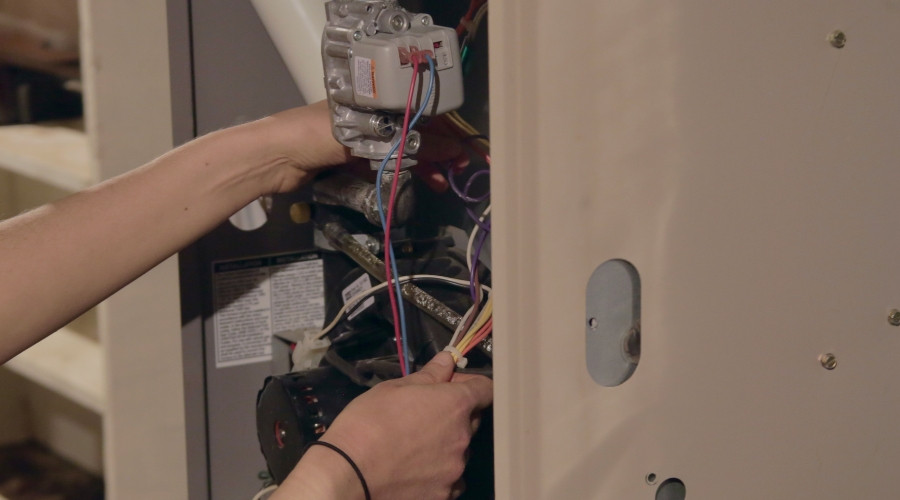When to Replace a Heater and Possible Alternatives
As heaters age, performance often declines gradually—until cold spots, strange noises, and rising bills make the problem hard to ignore. At that point, deciding between another repair and full heater replacement becomes an important choice for long-term comfort and cost control. This post explains common signs that heating system replacement may be needed and outlines two main alternatives to consider: furnace installation and heat pump installation.
Signs Heater Replacement Is Needed
 Most systems provide warning signs before failing completely. Age is one of the clearest indicators. As heating equipment ages, internal components wear out, efficiency declines, and repairs become more frequent. When an aging unit needs service again and again—especially for major components such as motors, heat exchangers, or control boards—replacing the heating system can be more economical than continuing to patch the old system.
Most systems provide warning signs before failing completely. Age is one of the clearest indicators. As heating equipment ages, internal components wear out, efficiency declines, and repairs become more frequent. When an aging unit needs service again and again—especially for major components such as motors, heat exchangers, or control boards—replacing the heating system can be more economical than continuing to patch the old system.
Energy costs provide another important clue. If utility bills increase from one heating season to the next while usage habits stay similar, the heater may be working harder and running longer to deliver the same warmth. That trend frequently points to declining efficiency and can signal that heater replacement should be on the horizon.
Comfort inside the home also tells a story. Persistent cold rooms, noticeable temperature swings, or a system that seems to run almost nonstop without maintaining set temperatures all suggest that the existing heater is no longer meeting demand. Unusual noises, frequent on–off cycling, or repeated mid-season breakdowns reinforce the case for planning a heating system replacement rather than waiting for a complete failure on the coldest day of the year.
Furnace Installation
A furnace is a central heating appliance that generates heat—commonly by burning gas, oil, or using electric resistance—and then distributes that heat as warm air through ductwork. Furnaces are a popular option for whole-home heating because they deliver strong, consistent warmth and can operate reliably for many years when properly maintained.
One key advantage of furnace installation is long-term durability. Quality furnaces are known for a long service life, often outlasting many comparable heat pump systems. Another major benefit is the air temperature supplied. Furnaces typically deliver hotter air than many heat pump units, which can be especially appealing in colder climates where robust heating capacity is essential. This hotter air often helps living spaces feel warm quickly after the system starts.
Modern furnace replacement also offers the opportunity to upgrade to quieter, more efficient models with better airflow control and enhanced safety features. For homes already equipped with ductwork and a fuel source, furnace installation generally fits smoothly into the existing layout, offering dependable heat and familiar operation while improving overall comfort.
Heat Pump Installation
 A heat pump works differently from a furnace. Instead of creating heat through combustion or electric resistance, a heat pump moves heat from one place to another using refrigerant. In cooler weather, it extracts heat from the outdoor air (or ground, depending on the type) and transfers it indoors. In warmer months, the cycle reverses so the same system provides cooling. This dual function means a single unit can often replace both a traditional heater and a separate air conditioner.
A heat pump works differently from a furnace. Instead of creating heat through combustion or electric resistance, a heat pump moves heat from one place to another using refrigerant. In cooler weather, it extracts heat from the outdoor air (or ground, depending on the type) and transfers it indoors. In warmer months, the cycle reverses so the same system provides cooling. This dual function means a single unit can often replace both a traditional heater and a separate air conditioner.
This ability to serve as both a heating and cooling solution is a major advantage of installing a heat pump. Maintenance can be simplified by focusing on one primary system, and space requirements for mechanical equipment may be reduced. Many households appreciate the year-round flexibility and streamlined design of a modern heat pump.
Heat pumps are also recognized for efficient operation under many conditions. Because they move heat instead of generating it directly, they often require less energy to maintain comfortable temperatures than some older heating technologies. That efficiency can translate into lower energy bills over time, particularly in moderate climates. For properties seeking an all-electric, high-efficiency option, heat pump replacement or first-time heat pump installation can be a compelling alternative to conventional systems.
In the end, the decision between furnace replacement and heat pump replacement depends on local climate, existing infrastructure, energy prices, and comfort preferences. Paying attention to warning signs from current equipment and comparing long-term operating costs helps identify the right moment and the right system for heater replacement.
About Atlantic Heating & Air Conditioning
Atlantic Heating & Air Conditioning is a top-rated HVAC company in Boston, established in 1962. They offer tailored solutions and peace of mind from industry-leading professionals. Call them today to schedule heater replacement in Boston, MA.



